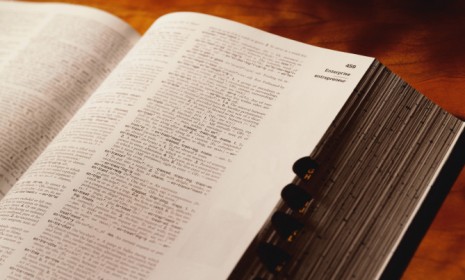'GIF': The Oxford American Dictionary's word of the year
The simple, jumpily animated images beat out words like superstorm, Higgs boson, and YOLO

A free daily email with the biggest news stories of the day – and the best features from TheWeek.com
You are now subscribed
Your newsletter sign-up was successful
In a move sure to delight BuzzFeed fans, the Oxford American Dictionary has announced that 2012's word of the year is "GIF." GIFs, a longstanding part of internet meme culture, are simple, jerkily animated images (for some helpful visual aids, check out BuzzFeed's collection of sports GIFs). The dictionary argues that this year, "GIF" broke free of the bounds of being a mere noun, transcending into the territory of verbs, where GIF has come to mean "to create a GIF file of (an image or video sequence, especially relating to an event)." The tech-friendly selection joins other recent winners, like "podcast" and "unfriend," in the internet's ongoing takeover of the English language. How did GIF rise to such prominence? What were the other contenders? And how is GIF really pronounced? Here, a guide:
Why GIF?
"The GIF, a compressed file format for images that can be used to create simple, looping animations, turned 25 this year, but like so many other relics of the 80s, it has never been trendier," explains Katherine Martin, Head of the U.S. Dictionaries Program, at the Oxford Dictionaries blog. "GIF celebrated a lexical milestone in 2012, gaining traction as a verb, not just a noun. The GIF has evolved from a medium for pop-cultural memes into a tool with serious applications including research and journalism, and its lexical identity is transforming to keep pace."
The Week
Escape your echo chamber. Get the facts behind the news, plus analysis from multiple perspectives.

Sign up for The Week's Free Newsletters
From our morning news briefing to a weekly Good News Newsletter, get the best of The Week delivered directly to your inbox.
From our morning news briefing to a weekly Good News Newsletter, get the best of The Week delivered directly to your inbox.
What were the biggest GIF moments in 2012?
Oxford offers a roster of the "highlights of the year in GIFing," from the 25th anniversary of the GIF in June to the viral ubiquity of Korean pop hit "Gangnam Style," with other commonly GIFfed events including the Summer Olympics and the U.S. presidential debates.
How is "GIF" pronounced?
Bloggers have debated for years whether "GIF" should have a hard G or a soft G sound, and they won't find a definitive answer from the Oxford American Dictionary. The book's blog decrees that "GIF may be pronounced with either a soft g (as in giant) or a hard g (as in graphic)." "Come on, Oxford, you're supposed to be an authority!" says Mario Aguilar at Gizmodo. Well, "both pronunciations are popular and valid, so like pop and soda, both will likely stay in use," says Devin Coldeway at Today.com.
A free daily email with the biggest news stories of the day – and the best features from TheWeek.com
What were the other contenders for word of the year?
The 2012 shortlist included superstorm ("an unusually large and destructive storm"), Higgs boson ("a subatomic particle whose existence is predicted by the theory that unified the weak and electromagnetic interactions"), and MOOC ("massive open online course; a university course offered free of charge via the internet"). Other contenders: "YOLO," an abbreviation for "you only live once," and "nomophobia," for the anxiety of being away from one's cell phone — shortened from "no mobile phobia."
Sources: Gizmodo, Today.com, Oxford American Dictionary (2) (3) (4) (5), Uproxx